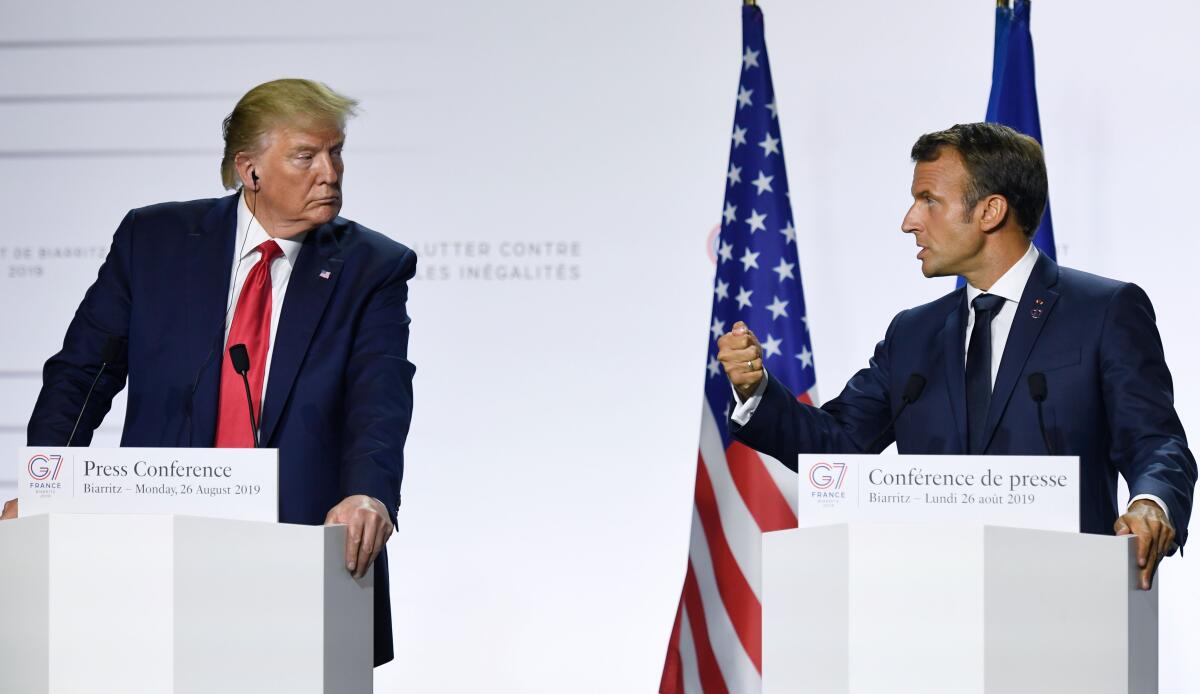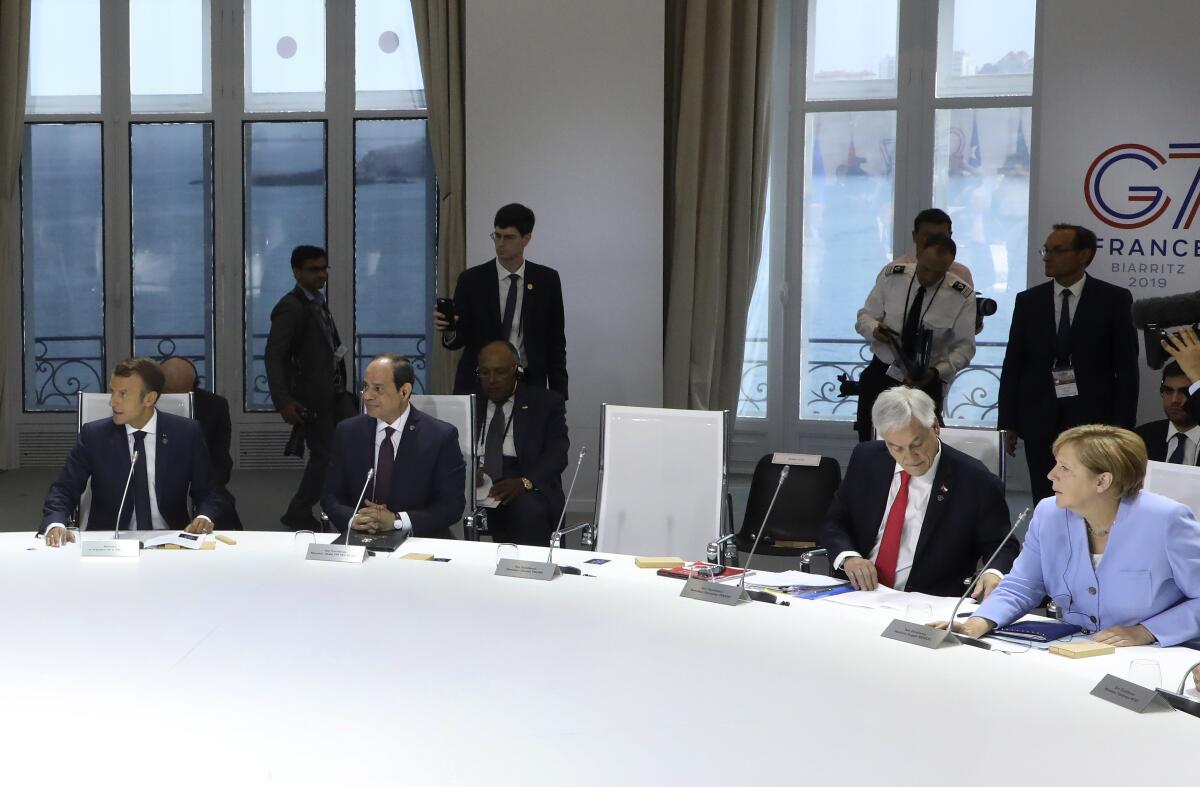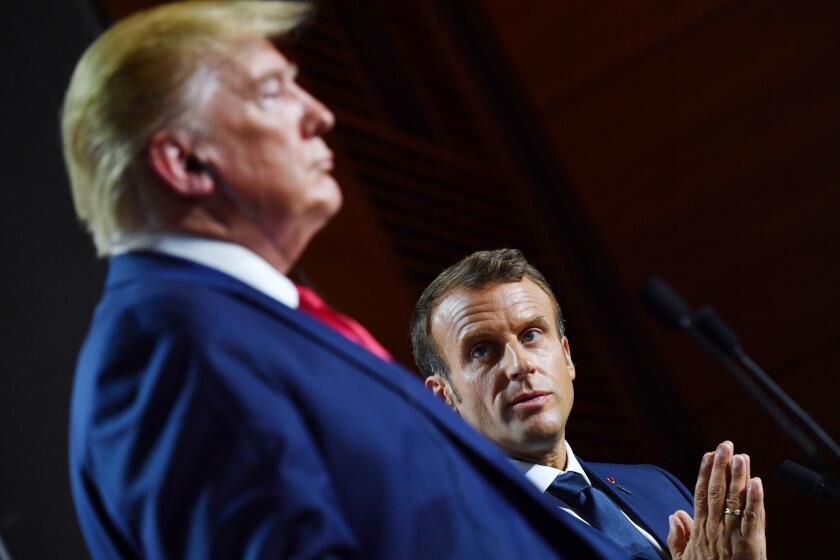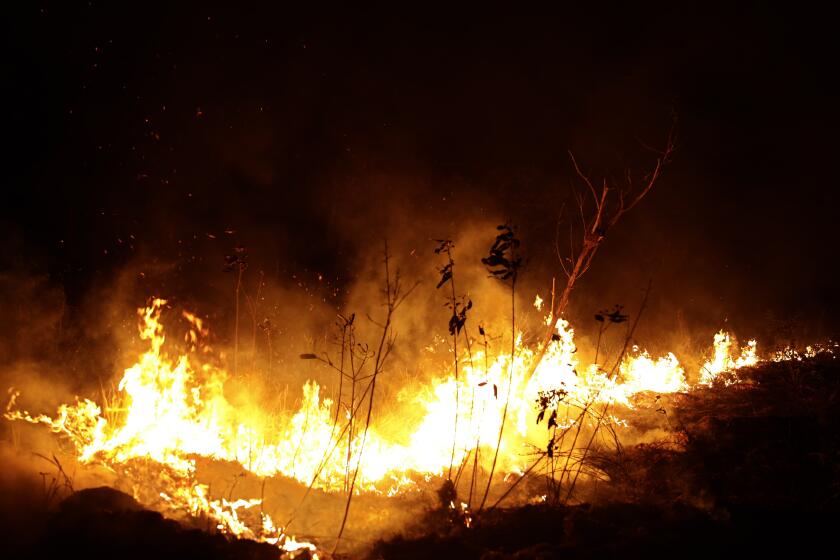Trump says he’s willing to negotiate with Iran, doesn’t want leadership change

- Share via
BIARRITZ, France — President Trump, who has repeatedly denounced his predecessor’s diplomacy with Iran, said Monday that he’s open to negotiating with Tehran over its nuclear program, signaling a possible new approach toward a government that he’s sanctioned for supporting terrorism in the Middle East.
“We’re not looking for leadership change,” Trump said, ruling out a goal that some of his top advisors have explicitly endorsed in the past. “This country has been through that many times before; that doesn’t work.”
Trump’s remarks at a news conference with French President Emmanuel Macron came on the final day of the Group of 7 summit that was otherwise dominated by the president’s efforts to soothe markets and other world leaders about his escalating trade conflict with China.
Asked about how the wide swings in his stance toward Beijing — threatening one day, placating the next — have unnerved investors and confused allies, Trump defended his approach.
“Sorry, it’s the way I negotiate,” he said. “It’s the way I negotiate. It’s done very well for me over the years. It’s doing even better for the country.”
He also confirmed that next year, when the U.S. has its turn to host the G-7, he plans for the meeting to be held at his Doral resort near Miami. He denied that the arrangement posed an ethical problem by using his government position to generate business for his company, and he insisted that he has lost money by being president but provided no evidence.
An opening to Iran, if it comes, would mark the beginning of another high-stakes foreign policy gambit for the president. He’s already engaged in regular meetings with Kim Jong Un in an effort — so far fruitless — to persuade the North Korean dictator to abandon his nuclear weapons.
Last year Trump pulled out of the agreement reached in 2015 by then-President Obama with Iran and five other nations that was aimed at preventing Iran from developing nuclear weapons. Macron has been looking for ways to salvage the deal, and Trump appeared amenable to the possibility during their joint news conference Monday.
“I really believe Iran could be a great nation, but they can’t have nuclear weapons,” Trump said. He suggested that the United States and European allies could offer Tehran loans or some other access to credit as an incentive for reaching a new deal and a respite from economic sanctions imposed by Washington.
Trump listed his goals as barring Tehran from having nuclear weapons or ballistic missiles and having an agreement that would last for “a longer period of time” than Obama’s, which was scheduled to restrict Iran’s nuclear program for a decade.
That was a notably slimmer list of demands than those outlined by Secretary of State Michael R. Pompeo, who has said Iran must withdraw forces from Syria and stop supporting militant groups that target Israel, among other steps. Trump’s stance is also out of sync with the hard-line views of John Bolton, his national security advisor, who has suggested that a change of government would be necessary in Tehran.
Macron has been carefully maneuvering to broker a meeting between Trump and Iranian President Hassan Rouhani. The French leader had a private meeting with Trump when he arrived at the G-7, then extended a surprise invitation to Iran’s foreign minister, Mohammad Javad Zarif, to visit Biarritz during the summit. Zarif met with French and other European officials, but not with the Americans.
Rouhani appeared open to the possibility of meeting with Trump.
“If I know that in meeting with somebody the problem of my country would be solved, I wouldn’t hesitate because the central issue is the national interests of the country,” he said in a statement posted on a government website after Zarif’s meetings with the Europeans.
A White House official told reporters Sunday that the U.S. delegation had not been warned about Zarif’s arrival, but Trump insisted Monday that Macron kept him in the loop.
“I knew everything he was doing,” he said. Macron said at the news conference that he had informed Trump of his plans when the two held a one-on-one meeting Saturday. It’s unclear whether Trump informed his staff.
There’s a deal to end a feud over France’s tax on tech giants, Emmanuel Macron said at G-7. Trump didn’t directly answer when asked to confirm.
Julianne Smith, a fellow at the Center for a New American Security, a bipartisan think tank, said Macron “found the right recipe” to handle Trump and seized an opportunity to influence him.
“Macron is smart,” Smith said. “He knows what he is up against. But he also knows Trump can be persuaded.”
Macron said the meeting between Trump and Rouhani could occur within weeks, and Trump said it could happen “if the circumstances are correct.”
Trump could shift gears depending on how much pushback he receives from both hard-liners in his administration and allies, including Israeli Prime Minister Benjamin Netanyahu, who’s facing a critical election in three weeks.
Netanyahu fiercely opposed Obama’s negotiations with Iran and has said that his signature diplomatic accomplishment was persuading Trump to abandon the deal.
He was visiting Israel’s border with Syria on Sunday, one of several places where Israel has been engaged in a series of skirmishes with Iranian proxies. He released a terse statement saying “Israel will continue to defend its security however that may be necessary.”
Hezbollah and the Lebanese army have blamed Israel for a drone attack on Beirut on Sunday morning while the leader of the Iran-backed Shiite militia and political party threatened retaliation.
Michael Doran, a senior fellow at the Hudson Institute, a conservative think tank, said conversations between Washington and Tehran could placate restless European allies and tamp down rising tensions in the Persian Gulf region, where Iranian forces have been seizing and harassing oil tankers.
“As long as they’re sitting at the table and talking, the Iranians have an incentive not to escalate,” Doran said.
He was among many analysts, however, who doubted that a deal could be reached, especially as Trump is running for reelection next year.
“The Iranians are not going to make a lasting agreement with Donald Trump until after the election,” Doran said.
Trump’s comments on Iran came after days of sowing confusion about the status of his trade war with China.
On Friday, he “ordered” U.S. companies to pull out of China. On Monday, he showered praise on Chinese leader Xi Jinping.
“One of the reasons that he’s a great leader, Xi, and one of the reasons China’s a great country is they understand how life works,” Trump said.
“China called last night our top trade people and said, ‘Let’s get back to the table,’” he added. “This is a very positive development for the world.”
The Dow closed up about 1% on Monday, although there was no confirmation from Chinese officials that such a call took place. Trump’s version of events have often conflicted with those of other world leaders, or even his own staff. Even though he presented the latest dialogue as a breakthrough that could lead to an agreement in days, talks between the U.S. and China were already scheduled to resume next month.
Pressed by reporters on whether a call from the Chinese actually had taken place the way Trump had said, Treasury Secretary Steven T. Mnuchin demurred.
“There were discussions that went back and forth, and let’s just leave it at that,” Mnuchin said.

Trump continued to insist that he was anything but an outlier among the leaders of the world’s most powerful industrialized democracies, while complaining about news reports focused on his disruptions at past summits and on Macron’s efforts to corral him at this year’s G-7.
But Trump was the only one to skip a session focused on climate change, a problem he’s downplayed or outright denied.
Asked later what he’s willing to do to fight climate change, Trump instead focused on developing fossil fuel resources in the U.S., a step that would generate more greenhouse gas emissions.
“The United States has tremendous wealth. The wealth is under its feet. I’ve made that wealth come alive,” Trump said.
He added, “I’m not going to lose that wealth on dreams, on windmills, which frankly aren’t working that well.”
The international pledges at a G-7 summit in France included $20 million from the group, as well as a separate $12 million from Britain and $11 million from Canada.
In the one-on-one meetings that are a prominent feature of the G-7 schedule, Trump has stressed areas of agreement, often overstating the alignment between him and his counterparts while mostly ignoring evidence of diverging views.
He claimed Sunday to be “on the same page” as Japanese Prime Minister Shinzo Abe about North Korea’s recent tests of short-range missiles, even as Abe called them a violation of United Nations Security Council resolutions while Trump refused to accept that judgment.
Trump also told reporters that some G-7 members agreed with his inclination to reinstate Russia to the group, although he declined to say which ones. Moscow was expelled from the G-7 after its 2014 annexation of the Ukrainian territory of Crimea.
German Chancellor Angela Merkel said Monday that there should be talks between Ukraine and Russia to resolve the conflict there.
“We have to try to bring this forward in the next few months,” she said, adding that “it’s a big problem, and there are enough problems in the world.”
Stokols reported from Biarritz, and Megerian and Wilkinson reported from Washington. Special correspondent Noga Tarnopolsky in Jerusalem contributed to this report.
More to Read
Get the L.A. Times Politics newsletter
Deeply reported insights into legislation, politics and policy from Sacramento, Washington and beyond. In your inbox twice per week.
You may occasionally receive promotional content from the Los Angeles Times.












